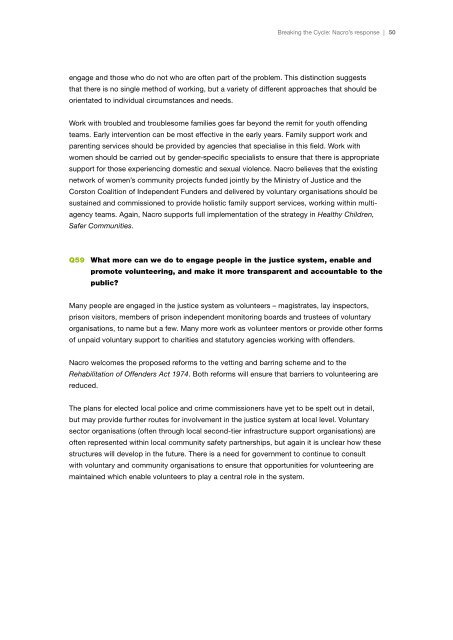Nacro's response to Breaking the Cycle Green Paper
Nacro's response to Breaking the Cycle Green Paper
Nacro's response to Breaking the Cycle Green Paper
You also want an ePaper? Increase the reach of your titles
YUMPU automatically turns print PDFs into web optimized ePapers that Google loves.
<strong>Breaking</strong> <strong>the</strong> <strong>Cycle</strong>: Nacro’s <strong>response</strong> | 50engage and those who do not who are often part of <strong>the</strong> problem. This distinction suggeststhat <strong>the</strong>re is no single method of working, but a variety of different approaches that should beorientated <strong>to</strong> individual circumstances and needs.Work with troubled and troublesome families goes far beyond <strong>the</strong> remit for youth offendingteams. Early intervention can be most effective in <strong>the</strong> early years. Family support work andparenting services should be provided by agencies that specialise in this field. Work withwomen should be carried out by gender-specific specialists <strong>to</strong> ensure that <strong>the</strong>re is appropriatesupport for those experiencing domestic and sexual violence. Nacro believes that <strong>the</strong> existingnetwork of women’s community projects funded jointly by <strong>the</strong> Ministry of Justice and <strong>the</strong>Cors<strong>to</strong>n Coalition of Independent Funders and delivered by voluntary organisations should besustained and commissioned <strong>to</strong> provide holistic family support services, working within multiagencyteams. Again, Nacro supports full implementation of <strong>the</strong> strategy in Healthy Children,Safer Communities.Q59 What more can we do <strong>to</strong> engage people in <strong>the</strong> justice system, enable andpromote volunteering, and make it more transparent and accountable <strong>to</strong> <strong>the</strong>public?Many people are engaged in <strong>the</strong> justice system as volunteers – magistrates, lay inspec<strong>to</strong>rs,prison visi<strong>to</strong>rs, members of prison independent moni<strong>to</strong>ring boards and trustees of voluntaryorganisations, <strong>to</strong> name but a few. Many more work as volunteer men<strong>to</strong>rs or provide o<strong>the</strong>r formsof unpaid voluntary support <strong>to</strong> charities and statu<strong>to</strong>ry agencies working with offenders.Nacro welcomes <strong>the</strong> proposed reforms <strong>to</strong> <strong>the</strong> vetting and barring scheme and <strong>to</strong> <strong>the</strong>Rehabilitation of Offenders Act 1974. Both reforms will ensure that barriers <strong>to</strong> volunteering arereduced.The plans for elected local police and crime commissioners have yet <strong>to</strong> be spelt out in detail,but may provide fur<strong>the</strong>r routes for involvement in <strong>the</strong> justice system at local level. Voluntarysec<strong>to</strong>r organisations (often through local second-tier infrastructure support organisations) areoften represented within local community safety partnerships, but again it is unclear how <strong>the</strong>sestructures will develop in <strong>the</strong> future. There is a need for government <strong>to</strong> continue <strong>to</strong> consultwith voluntary and community organisations <strong>to</strong> ensure that opportunities for volunteering aremaintained which enable volunteers <strong>to</strong> play a central role in <strong>the</strong> system.
















